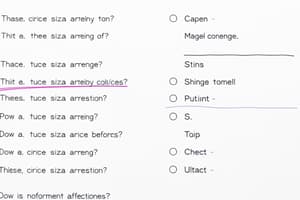Podcast
Questions and Answers
Which type of true or false question includes qualifiers to increase difficulty?
Which type of true or false question includes qualifiers to increase difficulty?
- Standard True/False
- Complex True/False (correct)
- Multiple True/False
- Negative Statements
What is a key practice when creating effective true or false statements?
What is a key practice when creating effective true or false statements?
- Using complex vocabulary for sophistication
- Employing ambiguous language to challenge respondents
- Ensuring clarity to avoid ambiguity (correct)
- Including personal opinions to guide responses
How is scoring typically handled in true or false assessments?
How is scoring typically handled in true or false assessments?
- Partial credit is always given for incorrect answers
- Binary scoring awards one point for correct answers (correct)
- Only true answers are counted for the total score
- Each statement receives equal weight regardless of difficulty
Which misconception is related to length regarding true statements?
Which misconception is related to length regarding true statements?
What common mistake involves misunderstanding the wording of true or false statements?
What common mistake involves misunderstanding the wording of true or false statements?
Which strategy should be prioritized when answering true or false questions?
Which strategy should be prioritized when answering true or false questions?
Which factor is most important when creating balanced true or false statements?
Which factor is most important when creating balanced true or false statements?
Which approach is NOT recommended for crafting effective true or false statements?
Which approach is NOT recommended for crafting effective true or false statements?
Study Notes
Types Of True Or False Questions
- Standard True/False: Simple statements where respondents choose true or false.
- Complex True/False: Statements that include qualifiers (e.g., "All," "Some," "None") to increase difficulty.
- Negative Statements: Phrased using "not" or other negations (e.g., "This statement is not true").
- Multiple True/False: Several statements presented together, requiring separate true/false judgments for each.
Creating Effective True Or False Statements
- Clarity: Use clear and straightforward language to avoid ambiguity.
- Specificity: Focus on specific facts rather than generalizations.
- Balanced Difficulty: Mix easy and challenging statements to assess knowledge accurately.
- Avoiding Double Negatives: Simplify statements to enhance comprehension.
- Fact-based Statements: Ensure statements are based on verifiable facts rather than opinions.
Scoring True Or False Assessments
- Binary Scoring: Each correct answer scores one point; incorrect answers score zero.
- Partial Credit: Consider awarding partial credit for statements that are partially correct (less common in traditional assessments).
- Weighting: Differentiate scores based on the importance of statements (more challenging questions may carry more points).
- Total Score Calculation: Sum total correct responses for overall performance assessment.
Common Misconceptions In True Or False Questions
- True Statements Are Always Longer: Length does not determine truth; some true statements can be concise.
- False Statements Are Always Obvious: False statements can be misleadingly plausible.
- True/False is Binary: Some questions may lack a clear true or false answer due to complexity or nuance.
- Negation Confusion: Misunderstanding negatives can lead to incorrect answers.
Strategies For Answering True Or False Questions
- Read Carefully: Pay attention to wording, qualifiers, and negations.
- Identify Keywords: Look for absolute terms (e.g., "always," "never") that can signal truth or falsity.
- Eliminate Extremes: Be cautious of statements that are overly broad or absolute.
- Fact Check When Possible: Recall knowledge or look for cues that validate or invalidate the statement.
- Use Logic: Apply critical thinking to assess the plausibility of the statement based on what you know.
Types Of True Or False Questions
- Standard True/False: Involves straightforward statements requiring a true or false response.
- Complex True/False: Incorporates qualifiers like "All," "Some," or "None," making it more challenging to ascertain the truth.
- Negative Statements: Utilizes negation, often using "not," which can complicate understanding.
- Multiple True/False: Presents several statements together, requiring individual true/false evaluations.
Creating Effective True Or False Statements
- Clarity: Language should be unambiguous and easy to understand to avoid confusion.
- Specificity: Statements should target concrete facts instead of vague generalities for precision in assessment.
- Balanced Difficulty: A mix of easy and hard questions allows for a fair evaluation of knowledge.
- Avoiding Double Negatives: Simplifying wording enhances comprehension and reduces the risk of misunderstanding.
- Fact-based Statements: Focus on statements that can be verified with facts, minimizing reliance on subjective opinions.
Scoring True Or False Assessments
- Binary Scoring: Each correct answer earns one point, while incorrect answers receive zero points.
- Partial Credit: Rarely awarded but can be considered for partially correct statements.
- Weighting: Allows for scoring variations based on the significance of individual questions, with tougher questions receiving higher points.
- Total Score Calculation: Overall performance is assessed by adding up correct answers.
Common Misconceptions In True Or False Questions
- True Statements Are Always Longer: Length isn't a reliable indicator of truth; concise statements can also be valid.
- False Statements Are Always Obvious: False claims may appear credible and require careful evaluation.
- True/False is Binary: Some statements may not conform to a strict true or false categorization due to complexity.
- Negation Confusion: Difficulty in interpreting negative constructions can lead to errors in answer selection.
Strategies For Answering True Or False Questions
- Read Carefully: Focus on all words, especially qualifiers and negatives, as they can change the meaning.
- Identify Keywords: Be alert for absolute terms like "always" or "never" that indicate potential truth values.
- Eliminate Extremes: Excessively broad statements should be approached with caution as they may be misleading.
- Fact Check When Possible: Use prior knowledge or contextual clues to affirm or dispute the statement's validity.
- Use Logic: Employ critical thinking skills to evaluate the plausibility and coherence of each statement.
Studying That Suits You
Use AI to generate personalized quizzes and flashcards to suit your learning preferences.
Description
Explore the various types of true or false questions and learn how to create effective statements. This quiz will guide you through clarity, specificity, and balanced difficulty in assessments, ensuring accurate evaluation of knowledge. Test your understanding of scoring methods and presentation styles for true or false questions.



